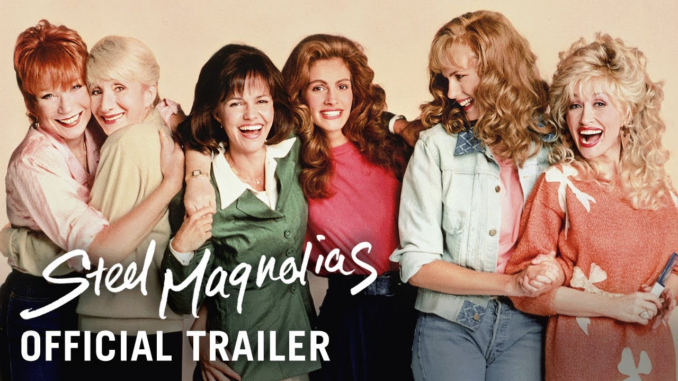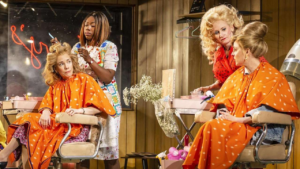
Thirty-five years ago Steel Magnolias turned Julia Roberts into a star and the rest of us into sobbing messes. Relive the story of how the 1989 Southern classic came to be.
What bride, when planning her vows, hasn’t declared, “My colors are blush and bashful”?
No? Just us?
Thirty-five years ago, those words were being uttered by a promising young thespian named Julia Roberts. Only 21 and with just seven credits to her name when filming began on Steel Magnolias, the Georgia native more than held her own among the likes of Dolly Parton, Sally Field, Olympia Dukakis, Daryl Hannah and Shirley MacLaine in a film about a coterie of woman in a small Southern community and how they deal with the death of one of their own.
Based on a true story, the 1989 tearjerker was meant as a tribute to playwright Robert Harling’s sister Susan, who passed due to complications from diabetes.
Following the success of the 1987 play of the same name, director Herbert Ross adapted it for the big screen, creating a star-studded Hollywood production that took over the small town of Natchitoches, La. “The L.A. people required things that you didn’t find at the local Piggly Wiggly,” Harling recalled to Garden and Gun in a 2017 look back. “I remember the manager of the store saying to a local reporter, ‘Yep, if it hadn’t been for Herbert Ross, nobody around here would know the difference between ostera and beluga.”
Caviar knowledge aside, the female-forward flick (noting how no men appeared in the stage version, The New York Times’ critic complained that in the film iteration “the male characters are no more substantial now than when they were invisible”) became one of the top-grossing films of 1989.

Roberts, the least known member of the cast, earned her first of four Oscar nominations for her turn as newlywed Shelby, who’s in fragile health but willing to risk her life for just a few years as a mom.
Off-camera, the success stories were just as real, with MacLaine declaring that the summer camp-style filming experience bonded them for life. Allow us to fill y’all in. 1. The movie came this close to never happening. Because, actually, Robert Harling never intended to be a playwright, earning a degree at Tulane University Law School before following his acting dreams to New York City. After his beloved younger sister got sick and passed away, however, he was inspired. “I wrote it to somehow get this true story off my chest and to celebrate my sister in the process,” he told The Huffington Post in 2014.
Like Steel Magnolias’ Shelby, he told Garden and Gun, Susan’s diabetes meant bearing kids could be life-threatening: “But she wanted a child, she went ahead and had a child, and then, sure enough, her metabolism started to fail—circulatory system, kidneys, the whole thing. It was much grimmer than I portrayed in the play.”
Initially he intended to write a short story, in part to share with his nephew one day to explain what happened to his mom. But a few pages in, he felt he wasn’t accurately capturing the women’s dialogue, so he switched course. Within 10 days, he’d scribbled out an entire play.
2. The names were also based on a true story. Shelby’s mother M’Lynn (Sally Field) was taken from a close friend. Shelby (Julia Roberts) was the name of one of his mother’s cousins, Clairee (Olympia Dukakis) “a fabulous aunt” and Ouiser (Shirley MacLaine) from his sister’s best friend. “She in no way resembled the character,” he said of the town curmudgeon. “But there was just something about the name that fit.”
Personalities were also lifted from the people he grew up with in Louisiana. “I’ve never told a living soul who Ouiser is based on,” he shared, saying he was worried it might offend. But when people came to see it, “Lo and behold, every woman in town was saying, ‘He based Ouiser on me.'”
3. They didn’t expect people to find the funny. “We played it like a drama,”said Margo Martindale, who took on the part of hairdresser Truvy in the play, largely set in the town salon. (Her role was later adopted by Dolly Parton.) “And then the first night it was in front of an audience, we were shocked. It was riotously funny and played straight as an arrow.”
The way Harling sees it, he just happened to know a lot of hilarious ladies. “They all love one-liners and they talk in bumper stickers,” he told Huffington Post, “and they’re sharp, funny women.”
4. For the family, the story was a place to openly grieve. “That play really did work miracles,” Harling’s brother John told Garden and Gun, “and I don’t use that term lightly.” Echoed his father, Bob, “I felt happy, I felt sad, I just couldn’t believe what was happening. But I was mostly feeling good, proud. It was a memorial to my daughter.”
